#ukpoli
Photo
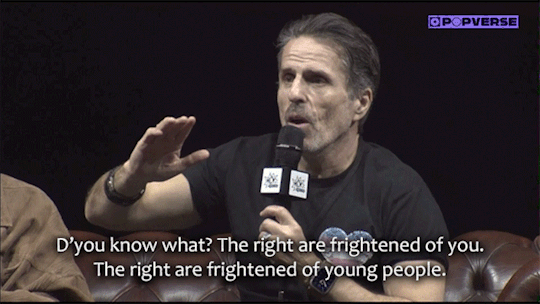
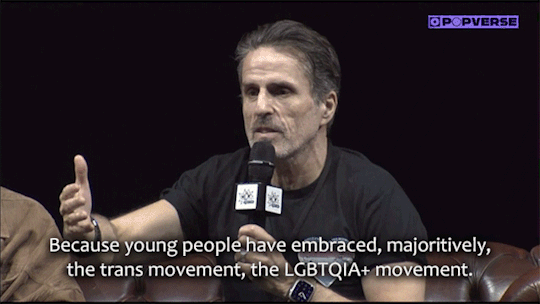

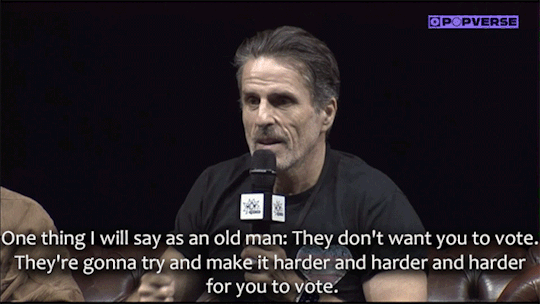
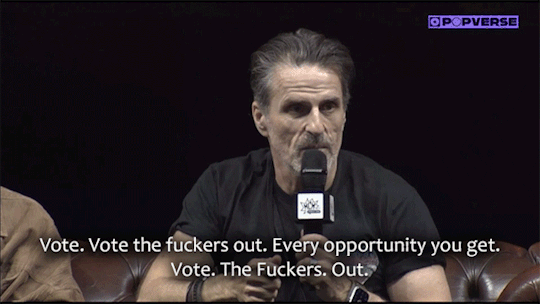
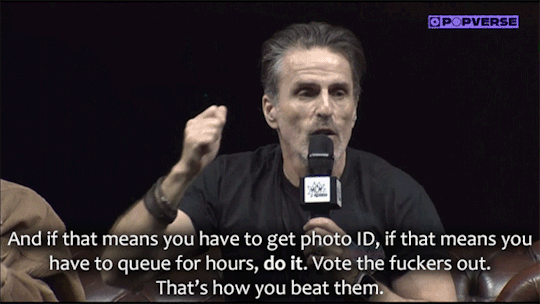
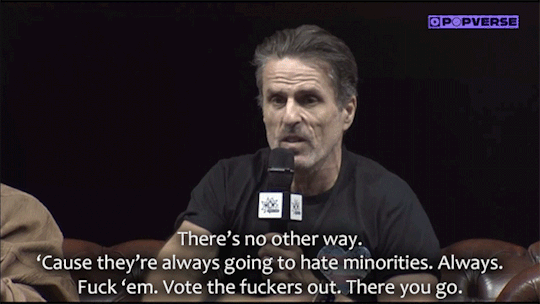

Con O’Neill, MCM Comic Con panel with Nathan Foad and Kristian Nairn, London May 27, 2023
Q: As someone who was a teenager for Section 28 Part 1, I just want to [...] say a massive thank you for speaking up about Section 28 Part 2. What's it been like at the moment, working on a show that has got such cool and interesting things to say about gender broadly and masculinity more specifically?
#Our Flag Means Death#trans rights#LGBTQIA+ rights#MCM2023#MCM Comic Con 2023#Con O'Neill#Nathan Foad#Kristian Nairn#UKpoli#voter suppression#vote
17K notes
·
View notes
Text
Palantir’s NHS-stealing Big Lie
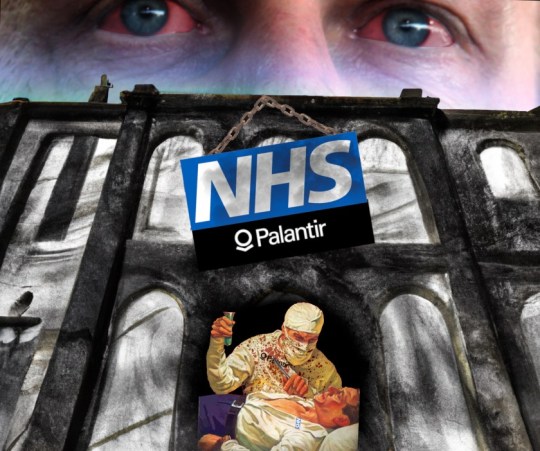
I'm on tour with my new, nationally bestselling novel The Bezzle! Catch me in TUCSON (Mar 9-10), then SAN FRANCISCO (Mar 13), Anaheim, and more!

Capitalism's Big Lie in four words: "There is no alternative." Looters use this lie for cover, insisting that they're hard-nosed grownups living in the reality of human nature, incentives, and facts (which don't care about your feelings).
The point of "there is no alternative" is to extinguish the innovative imagination. "There is no alternative" is really "stop trying to think of alternatives, dammit." But there are always alternatives, and the only reason to demand that they be excluded from consideration is that these alternatives are manifestly superior to the looter's supposed inevitability.
Right now, there's an attempt underway to loot the NHS, the UK's single most beloved institution. The NHS has been under sustained assault for decades – budget cuts, overt and stealth privatisation, etc. But one of its crown jewels has been stubbournly resistant to being auctioned off: patient data. Not that HMG hasn't repeatedly tried to flog patient data – it's just that the public won't stand for it:
https://www.theguardian.com/society/2023/nov/21/nhs-data-platform-may-be-undermined-by-lack-of-public-trust-warn-campaigners
Patients – quite reasonably – do not trust the private sector to handle their sensitive medical records.
Now, this presents a real conundrum, because NHS patient data, taken as a whole, holds untold medical insights. The UK is a large and diverse country and those records in aggregate can help researchers understand the efficacy of various medicines and other interventions. Leaving that data inert and unanalysed will cost lives: in the UK, and all over the world.
For years, the stock answer to "how do we do science on NHS records without violating patient privacy?" has been "just anonymise the data." The claim is that if you replace patient names with random numbers, you can release the data to research partners without compromising patient privacy, because no one will be able to turn those numbers back into names.
It would be great if this were true, but it isn't. In theory and in practice, it is surprisingly easy to "re-identify" individuals in anonymous data-sets. To take an obvious example: we know which two dates former PM Tony Blair was given a specific treatment for a cardiac emergency, because this happened while he was in office. We also know Blair's date of birth. Check any trove of NHS data that records a person who matches those three facts and you've found Tony Blair – and all the private data contained alongside those public facts is now in the public domain, forever.
Not everyone has Tony Blair's reidentification hooks, but everyone has data in some kind of database, and those databases are continually being breached, leaked or intentionally released. A breach from a taxi service like Addison-Lee or Uber, or from Transport for London, will reveal the journeys that immediately preceded each prescription at each clinic or hospital in an "anonymous" NHS dataset, which can then be cross-referenced to databases of home addresses and workplaces. In an eyeblink, millions of Britons' records of receiving treatment for STIs or cancer can be connected with named individuals – again, forever.
Re-identification attacks are now considered inevitable; security researchers have made a sport out of seeing how little additional information they need to re-identify individuals in anonymised data-sets. A surprising number of people in any large data-set can be re-identified based on a single characteristic in the data-set.
Given all this, anonymous NHS data releases should have been ruled out years ago. Instead, NHS records are to be handed over to the US military surveillance company Palantir, a notorious human-rights abuser and supplier to the world's most disgusting authoritarian regimes. Palantir – founded by the far-right Trump bagman Peter Thiel – takes its name from the evil wizard Sauron's all-seeing orb in Lord of the Rings ("Sauron, are we the baddies?"):
https://pluralistic.net/2022/10/01/the-palantir-will-see-you-now/#public-private-partnership
The argument for turning over Britons' most sensitive personal data to an offshore war-crimes company is "there is no alternative." The UK needs the medical insights in those NHS records, and this is the only way to get at them.
As with every instance of "there is no alternative," this turns out to be a lie. What's more, the alternative is vastly superior to this chumocratic sell-out, was Made in Britain, and is the envy of medical researchers the world 'round. That alternative is "trusted research environments." In a new article for the Good Law Project, I describe these nigh-miraculous tools for privacy-preserving, best-of-breed medical research:
https://goodlawproject.org/cory-doctorow-health-data-it-isnt-just-palantir-or-bust/
At the outset of the covid pandemic Oxford's Ben Goldacre and his colleagues set out to perform realtime analysis of the data flooding into NHS trusts up and down the country, in order to learn more about this new disease. To do so, they created Opensafely, an open-source database that was tied into each NHS trust's own patient record systems:
https://timharford.com/2022/07/how-to-save-more-lives-and-avoid-a-privacy-apocalypse/
Opensafely has its own database query language, built on SQL, but tailored to medical research. Researchers write programs in this language to extract aggregate data from each NHS trust's servers, posing medical questions of the data without ever directly touching it. These programs are published in advance on a git server, and are preflighted on synthetic NHS data on a test server. Once the program is approved, it is sent to the main Opensafely server, which then farms out parts of the query to each NHS trust, packages up the results, and publishes them to a public repository.
This is better than "the best of both worlds." This public scientific process, with peer review and disclosure built in, allows for frequent, complex analysis of NHS data without giving a single third party access to a a single patient record, ever. Opensafely was wildly successful: in just months, Opensafely collaborators published sixty blockbuster papers in Nature – science that shaped the world's response to the pandemic.
Opensafely was so successful that the Secretary of State for Health and Social Care commissioned a review of the programme with an eye to expanding it to serve as the nation's default way of conducting research on medical data:
https://www.gov.uk/government/publications/better-broader-safer-using-health-data-for-research-and-analysis/better-broader-safer-using-health-data-for-research-and-analysis
This approach is cheaper, safer, and more effective than handing hundreds of millions of pounds to Palantir and hoping they will manage the impossible: anonymising data well enough that it is never re-identified. Trusted Research Environments have been endorsed by national associations of doctors and researchers as the superior alternative to giving the NHS's data to Peter Thiel or any other sharp operator seeking a public contract.
As a lifelong privacy campaigner, I find this approach nothing short of inspiring. I would love for there to be a way for publishers and researchers to glean privacy-preserving insights from public library checkouts (such a system would prove an important counter to Amazon's proprietary god's-eye view of reading habits); or BBC podcasts or streaming video viewership.
You see, there is an alternative. We don't have to choose between science and privacy, or the public interest and private gain. There's always an alternative – if there wasn't, the other side wouldn't have to continuously repeat the lie that no alternative is possible.

Name your price for 18 of my DRM-free ebooks and support the Electronic Frontier Foundation with the Humble Cory Doctorow Bundle.

If you'd like an essay-formatted version of this post to read or share, here's a link to it on pluralistic.net, my surveillance-free, ad-free, tracker-free blog:
https://pluralistic.net/2024/03/08/the-fire-of-orodruin/#are-we-the-baddies

Image:
Gage Skidmore (modified)
https://commons.m.wikimedia.org/wiki/File:Peter_Thiel_(51876933345).jpg
CC BY-SA 2.0
https://creativecommons.org/licenses/by-sa/2.0/deed.en
#pluralistic#peter thiel#trusted research environment#opensafely#medical data#floss#privacy#reidentification#anonymization#anonymisation#nhs#ukpoli#uk#ben goldacre#goldacre report#science#evidence-based medicine#goldacre review#interoperability#transparency
520 notes
·
View notes
Text
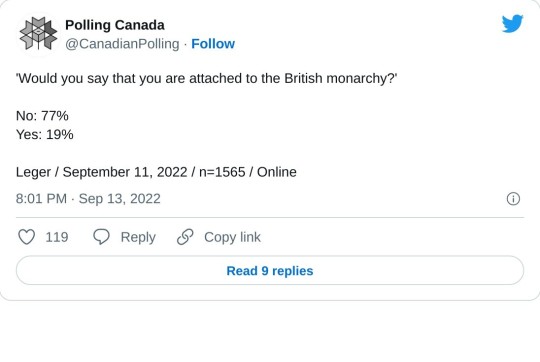
View on Twitter
lol. Anyways, abolish the Monarchy.
Tagging: @politicsofcanada
#Abolish the monarchy#British Monarchy#ukpoli#cdnpoli#canada#canadian politics#canadian news#canadian
706 notes
·
View notes
Text
youtube
For anyone not in the UK like me (or if you are in the UK and you like concise, well researched videos about major news events), TLDR News did a great segment on WHAT THE HECK is happening in Scotland right now and why it's a big freaking deal.
#UK politics#ukpoli#scotland#politics#trans stuff#gender recognition certificates#gender recognition act#scottish politics#emily talks#Youtube
11 notes
·
View notes
Text
They should make Larry the cat the new king
9 notes
·
View notes
Text
they are turning old growth forests — trees hundreds and hundreds of years old — into wood pellets for electricity
7 notes
·
View notes
Text

At the Labour conference on October 10th, Keir Starmer, leader of the opposition (the Labour party) was covered in glitter by a protester saying 'True democracy is citizen led. Politics needs an update. We demand a people's House.'
So I did a bit of research on the protester and apparently he's affiliated with a group called People Demand Democracy who as the name suggests want to make the system more democratic.
According to their website, they are 'calling for a fair, proportional voting system for Westminster elections and a permanent, legally-binding national House of Citizens, selected by democratic lottery,' because 'we need a democratic alternative that gives the people of the UK a voice to deal with the major challenges of our time: rampant inequality, an escalating climate crisis, political corruption and on.' (https://www.peopledemanddemocracy.com/news)
Look I'm not saying that we shouldn't be looking for ways to make the system more democratic and representative but I think there are drawbacks to the solutions that they have proposed.
1: The introduction of proportional representation
The system currently used in the UK is the first past the post system in which each constituency (or area) votes for their MP who sits in the House of Commons, therefore they have a 'seat' in parliament. The party with the most 'seats' forms the government. The idea is a government will get a majority so it is easier to pass legislation.
The drawbacks of proportional representation is that it is less likely for parties to win an outright majority. In response two parties will form a coalition government so will have to work together. The problem with this is that frequently the two parties dont agree and so very little gets done. The last coalition government in the UK was between the Conservatives and the Liberal Democrats in 2011.
Both systems have their flaws. Though proportional representation is undoubtedly more democratic I don't think that it will create the strongest government. At some point you have to sacrifice democracy for stability and where the current system just manages to toe the line, proportional representation can be considered a step to far. That's not to say it doesn't work in other countries but not for the UK
2: The introduction of a House of Citizens alongside the existing House of Commons and the House of Lords
I'll try and run though this quick
In House of Lords (red) sits 'experts' in their field as well as hereditary peers (some people think that practice is outdated). They scrutinise the government. Legislation must go though both houses before it can be passed.
House of Commons (green) contains the government (PM, ministers, shadow ministers) and all the other MPs. Here debates are held about bills, as well as Prime Minister Question time.
These houses make up the Houses of Parliament
The problem with a 'House if Citizens' is that it would be trying to do what the House of Commons is supposed to do. (I understand it doesn't always do what it should but stick with me)
The House of Commons is where the people, the commoners, are represented. If a House of Citizens was introduced to 'give the people of the UK a voice' it suggests that the House of Commons is not doing their task correctly. I'd assume that to make the House of Citizens truly representative of the people, stipulations would be added so that you could only be there depending on your income or job title perhaps.
If that were the case, there would create a larger class divide and more disolutionment with democracy seeing that the House of Citizens would focus on 'climate crisis' and 'political corruption'. Though these are both very important topics, they're not exactly the budget or international affairs. It suggests that the everyday person is only capable of managing the seemingly insignificant parts of politics, and that the important stuff needs to be left to the 'professionals' in the Commons.
I think that though it's good in theory the optics look bad. There would be room then for the House of Commons to take more control over public life because they, too, have been voted in but for the 'important' matters, and so 'must be more capable than the Citizens' because they're in the Commons.
I think thats a really cynical view for me to hold but I do believe that the solutions proposed by People Demand Democracy are too optimistic in places. I would like a committee to look into political corruption and for it to be taken more seriously though because recently there have been so many scandals we've all become desensitised to them.
We do need change in our political system.
The only question is: How?
#keir starmer#glitter#house of commons#People Demand Democracy#uk politics#government#british politics#labour party#Labour party conference
3 notes
·
View notes
Link
We now know how Couzens’ status as a policeman was deployed to end a woman’s life, which makes the efforts to retrospectively disassociate him from the police as an institution all the more offensive. Media outlets have described him as a “former” or “ex” policeman, but he was only dismissed after his crimes were uncovered. He was an active officer at the time of the murder, which is how he should be represented. A former senior detective who worked on the case has said: “Police officers do not view Wayne Couzens as a police officer. They view him as a murderer who happened to be a police officer, rather than the other way around: a police officer who is a murderer.” The logic at work here is a perfect demonstration of how institutions become irredeemably rotten. The logic is: the police are good, therefore the bad man simply is not a policeman.
It is in its way a perfect bit of fantasy, almost inarguable. The position of the police in our society relies on the delusion that they are always benevolent, always acting in pursuit of justice and public well-being. Anything which undermines that lie must be suppressed, denied, or wished out of existence. But many demographics, routinely abused by police, have long known that this is a lie. All but the most zealous apologists must be able to see it too, by now. The totality of power given to officers overrides the humanity of both subject and enforcer: the institution is not fit for purpose. Couzens’ position as a policeman was not incidental to this murder: as with every act of violence committed by the police, his position literally and materially enabled the crime to occur.
4 notes
·
View notes
Photo

Your👏 mask👏 is👏 for👏 protecting👏 others👏 more👏 than👏 for👏 protecting👏 yourself.👏 #wearamask #takecareofeachother #forgoodnesssake #lifeinthetimeofcorona #lifeinthetimeofsocialdistancing #ukpoli #sayitlouderforthepeopleintheback #only50percentofukfullyvaccinated #notoutofthewoodsyet https://www.instagram.com/p/CQ8OhoHFKbw/?utm_medium=tumblr
#wearamask#takecareofeachother#forgoodnesssake#lifeinthetimeofcorona#lifeinthetimeofsocialdistancing#ukpoli#sayitlouderforthepeopleintheback#only50percentofukfullyvaccinated#notoutofthewoodsyet
2 notes
·
View notes
Text
Listen,
Solidarity from across the pond in Canada with the working class, the poor, the vulnerable, hungry and disabled folks across the United Kingdom who did not wish to endure more austerity and dangerous Brexit policy under the Tory government
I hear you. We hear you. You are not alone
9 notes
·
View notes
Text
(June 2019)
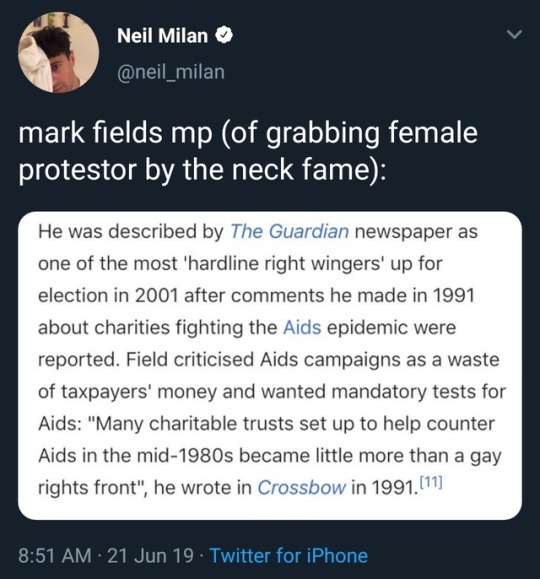
1 note
·
View note
Text
End of the line for corporate sovereignty
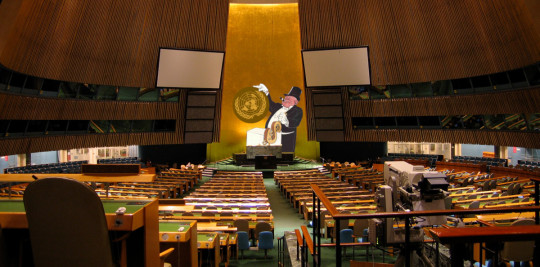
I'm on tour with my new, nationally bestselling novel The Bezzle! Catch me next weekend (Mar 30/31) in ANAHEIM at WONDERCON, then in Boston with Randall "XKCD" Munroe (Apr 11), then Providence (Apr 12), and beyond!

Back in the 1950s, a new, democratically elected Iranian government nationalized foreign oil interests. The UK and the US then backed a coup, deposing the progressive government with one more hospitable to foreign corporations:
https://en.wikipedia.org/wiki/Nationalization_of_the_Iranian_oil_industry
This nasty piece of geopolitical skullduggery led to the mother-of-all-blowbacks: the Anglo-American puppet regime was toppled by the Ayatollah and his cronies, who have led Iran ever since.
For the US and the UK, the lesson was clear: they needed a less kinetic way to ensure that sovereign countries around the world steered clear of policies that undermined the profits of their oil companies and other commercial giants. Thus, the "investor-state dispute settlement" (ISDS) was born.
The modern ISDS was perfected in the 1990s with the Energy Charter Treaty (ECT). The ECT was meant to foam the runway for western corporations seeking to take over ex-Soviet energy facilities, by making those new post-Glasnost governments promise to never pass laws that would undermine foreign companies' profits.
But as Nick Dearden writes for Jacobin, the western companies that pushed the east into the ECT failed to anticipate that ISDSes have their own form of blowback:
https://jacobin.com/2024/03/energy-charter-treaty-climate-change/
When the 2000s rolled around and countries like the Netherlands and Denmark started to pass rules to limit fossil fuels and promote renewables, German coal companies sued the shit out of these governments and forced them to either back off on their democratically negotiated policies, or to pay gigantic settlements to German corporations.
ISDS settlements are truly grotesque: they're not just a matter of buying out existing investments made by foreign companies and refunding them money spent on them. ISDS tribunals routinely order governments to pay foreign corporations all the profits they might have made from those investments.
For example, the UK company Rockhopper went after Italy for limiting offshore drilling in response to mass protests, and took $350m out of the Italian government. Now, Rockhopper only spent $50m on Adriatic oil exploration – the other $300m was to compensate Rockhopper for the profits it might have made if it actually got to pump oil off the Italian coast.
Governments, both left and right, grew steadily more outraged that ISDSes tied the hands of democratically elected lawmakers and subordinated their national sovereignty to corporate sovereignty. By 2023, nine EU countries were ready to pull out of the ECT.
But the ECT had another trick up its sleeve: a 20-year "sunset" clause that bound countries to go on enforcing the ECT's provisions – including ISDS rulings – for two decades after pulling out of the treaty. This prompted European governments to hit on the strategy of a simultaneous, mass withdrawal from the ECT, which would prevent companies registered in any of the ex-ECT countries from suing under the ECT.
It will not surprise you to learn that the UK did not join this pan-European coalition to wriggle out of the ECT. On the one hand, there's the Tories' commitment to markets above all else (as the Trashfuture podcast often points out, the UK government is the only neoliberal state so committed to austerity that it's actually dismantling its own police force). On the other hand, there's Rishi Sunak's planet-immolating promise to "max out North Sea oil."
But as the rest of the world transitions to renewables, different blocs in the UK – from unions to Tory MPs – are realizing that the country's membership in ECT and its fossil fuel commitment is going to make it a world leader in an increasingly irrelevant boondoggle – and so now the UK is also planning to pull out of the ECT.
As Dearden writes, the oil-loving, market-worshipping UK's departure from the ECT means that the whole idea of ISDSes is in danger. After all, some of the world's poorest countries are also fed up to the eyeballs with ISDSes and threatening to leave treaties that impose them.
One country has already pulled out: Honduras. Honduras is home to Prospera, a libertarian autonomous zone on the island of Roatan. Prospera was born after a US-backed drug kingpin named Porfirio Lobo Sosa overthrew the democratic government of Manuel Zelaya in 2009.
The Lobo Sosa regime established a system of special economic zones (known by their Spanish acronym, "ZEDEs"). Foreign investors who established a ZEDE would be exempted from Honduran law, allowing them to create "charter cities" with their own private criminal and civil code and tax system.
This was so extreme that the Honduran supreme court rejected the plan, so Lobo Sosa fired the court and replaced them with cronies who'd back his play.
A group of crypto bros capitalized on this development, using various ruses to establish a ZEDE on the island of Roatan, a largely English-speaking, Afro-Carribean island known for its marine reserve, its SCUBA diving, and its cruise ship port. This "charter city" included every bizarre idea from the long history of doomed "libertarian exit" projects, so ably recounted in Raymond Craib's excellent 2022 book Adventure Capitalism:
https://pluralistic.net/2022/06/14/this-way-to-the-egress/#terra-nullius
Right from the start, Prospera was ill starred. Paul Romer, the Nobel-winning economist most closely associated with the idea of charter cities, disavowed the project. Locals hated it – the tourist shops and restaurants on Roatan all may sport dusty "Bitcoin accepted here" signs, but not one of those shops takes cryptocurrency.
But the real danger to Prospera came from democracy itself. When Xiomara Castro – wife of Manuel Zelaya – was elected president in 2021, she announced an end to the ZEDE program. Prospera countered by suing Honduras under the ISDS provisions of the Central America Free Trade Agreements, seeking $10b, a third of the country's GDP.
In response, President Castro announced her country's departure from CAFTA, and the World Bank's International Centre for Settlement of Investment Disputes:
https://theintercept.com/2024/03/19/honduras-crypto-investors-world-bank-prospera/
An open letter by progressive economists in support of President Castro condemns ISDSes for costing latinamerican countries $30b in corporate compensation, triggered by laws protecting labor rights, vulnerable ecosystems and the climate:
https://progressive.international/wire/2024-03-18-economists-the-era-of-corporate-supremacy-in-the-international-trade-system-is-coming-to-an-end/en
As Ryan Grim writes for The Intercept, the ZEDE law is wildly unpopular with the Honduran people, and Merrick Garland called the Lobo Sosa regime that created it "a narco-state where violent drug traffickers were allowed to operate with virtual impunity":
https://theintercept.com/2024/03/19/honduras-crypto-investors-world-bank-prospera/
The world's worst people are furious and terrified about Honduras's withdrawal from its ISDS. After 60+ years of wrapping democracy in chains to protect corporate profits, the collapse of the corporate kangaroo courts that override democratic laws represents a serious threat to oligarchy.
As Dearden writes, "elsewhere in the world, ISDS cases have been brought specifically on the basis that governments have not done enough to suppress protest movements in the interests of foreign capital."
It's not just poor countries in the global south, either. When Australia passed a plain-packaging law for tobacco, Philip Morris relocated offshore in order to bring an ISDS case against the Australian government in a bid to remove impediments to tobacco sales:
https://isds.bilaterals.org/?philip-morris-vs-australia-isds
And in 2015, the WTO sanctioned the US government for its "dolphin-safe" tuna labeling, arguing that this eroded the profits of corporations that fished for tuna in ways that killed a lot of dolphins:
https://theintercept.com/2015/11/24/wto-ruling-on-dolphin-safe-tuna-labeling-illustrates-supremacy-of-trade-agreements/
In Canada, the Conservative hero Steven Harper entered into the Canada-China Foreign Investment Promotion and Protection Agreement, which banned Canada from passing laws that undermined the profits of Chinese corporations for 31 years (the rule expires in 2045):
https://www.vancouverobserver.com/news/harper-oks-potentially-unconstitutional-china-canada-fipa-deal-coming-force-october-1
Harper's successor, Justin Trudeau, went on to sign the Canada-EU Trade Agreement that Harper negotiated, including its ISDS provisions that let EU corporations override Canadian laws:
https://www.cbc.ca/news/politics/trudeau-eu-parliament-schulz-ceta-1.3415689
There was a time when any challenge to ISDS was a political third rail. Back in 2015, even hinting that ISDSes should be slightly modified would send corporate thinktanks into a frenzy:
https://www.techdirt.com/2015/07/20/eu-proposes-to-reform-corporate-sovereignty-slightly-us-think-tank-goes-into-panic-mode/
But over the years, there's been a growing consensus that nations can only be sovereign if corporations aren't. It's one thing to treat corporations as "persons," but another thing altogether to elevate them above personhood and subordinate entire nations to their whims.
With the world's richest countries pulling out of ISDSes alongside the world's poorest ones, it's feeling like the end of the road for this particularly nasty form of corporate corruption.
And not a moment too soon.

If you'd like an essay-formatted version of this post to read or share, here's a link to it on pluralistic.net, my surveillance-free, ad-free, tracker-free blog:
https://pluralistic.net/2024/03/27/korporate-kangaroo-kourts/#corporate-sovereignty

Image:
ChrisErbach (modified)
https://commons.wikimedia.org/wiki/File:UnitedNations_GeneralAssemblyChamber.jpg
CC BY-SA 3.0
https://creativecommons.org/licenses/by-sa/3.0/deed.en
#pluralistic#isds#investor state dispute settlement#steven harper#canada#canpoli#ukpoli#honduras#prospera#roatan#Energy Charter Treaty#ect#eu#rockhopper#world bank#charter cities#cryptocurrency#libertarian exit#Xiomara Castro
220 notes
·
View notes
Video
Alberta NDP MLA Marlin Schmidt on Margaret Thatcher:
"I can still go on to enjoy the fact that Margaret Thatcher is dead. The only thing I regret about Margaret Thatcher's death is that it happened probably 30 years too late"
The UCP are losing their minds right now.
Tagging: @politicsofcanada @abpoli
415 notes
·
View notes
Text
Classified U.K. defense papers found in ‘soggy heap’ at bus stop: report
Classified U.K. defense papers found in ‘soggy heap’ at bus stop: report
Sensitive defense documents containing details about the British military have been found at a bus stop in England, the BBC reported Sunday.
The papers included plans for a possible U.K. military presence in Afghanistan, as well as discussion about the potential Russian reaction to the British warship HMS Defender’s travel through waters off the Crimean coast last week, the BBC said.
Read…

View On WordPress
#classified defense papers uk#Crimea#england#Europe#London#Politics#Russia#uk classified defense papers#uk defense documents#uk documents leak#UK politics#ukpoli#World
0 notes
Text
Classified U.K. defense papers found in ‘soggy heap’ at bus stop: report - National
Classified U.K. defense papers found in ‘soggy heap’ at bus stop: report – National
Sensitive defense documents containing details about the British military have been found at a bus stop in England, the BBC reported Sunday.
The papers included plans for a possible U.K. military presence in Afghanistan, as well as discussion about the potential Russian reaction to the British warship HMS Defender’s travel through waters off the Crimean coast last week, the BBC said.
Read…

View On WordPress
#classified defense papers uk#Crimea#England#Europe#london#Politics#Russia#uk classified defense papers#uk defense documents#uk documents leak#UK politics#ukpoli#World
0 notes
Link
Theresa May told the Commons that it was important that the government tightened up the use of NDAs, saying “it is clear that some employers are using them unethically”.
The prime minister was speaking after the Daily Telegraph reported that an unnamed “leading businessman” had used NDAs to pay off former employees who had accused him of bullying, sexual harassment and racial abuse, in what it described as “a British #MeToo scandal”.
The court of appeal granted a temporary injunction on Tuesday blocking the newspaper from identifying the man, overturning an earlier finding by the high court that to do so was in the public interest. According to the ruling, in five cases “substantial settlements” were made to employees as part of NDAs. […]
The Telegraph said its reporters had spoken to more than two dozen former employees of the businessman and had heard allegations of bullying, sexual harassment and racial abuse of staff.
#ukpoli#freedom of press#metoo#ndas#injunctions#this will be interesting#and might have implications on superinjunctions as well#there is a clear public interest in reporting these#but not much has changed since trafigura
2 notes
·
View notes